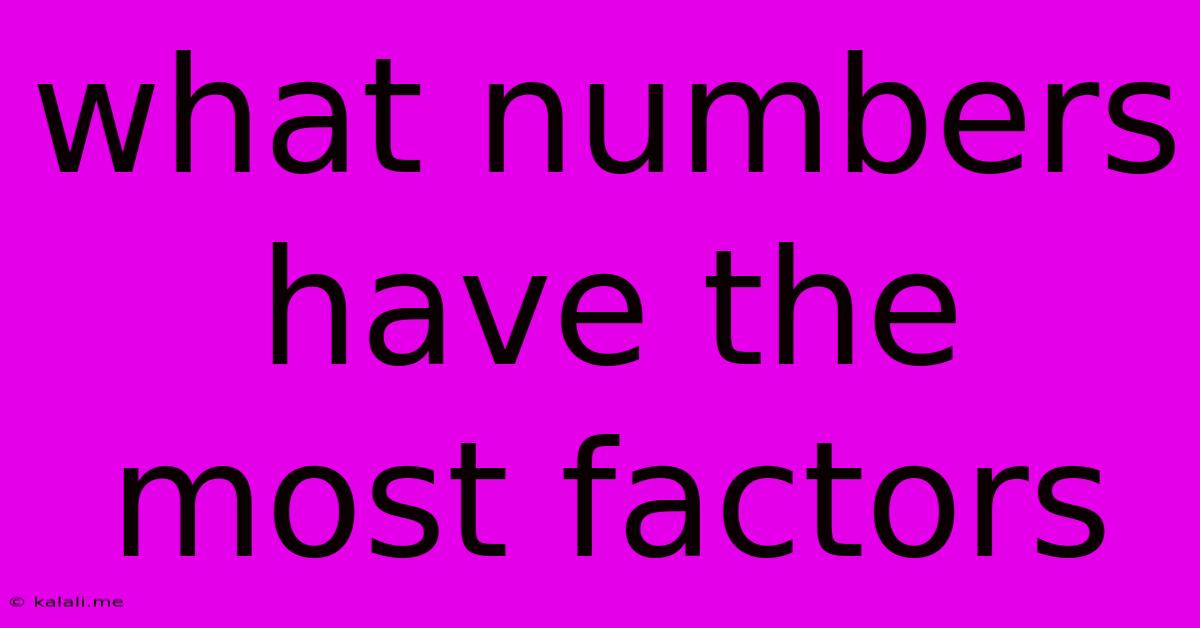What Numbers Have The Most Factors
Kalali
May 30, 2025 · 3 min read

Table of Contents
What Numbers Have the Most Factors? Unlocking the Secrets of Highly Composite Numbers
Finding numbers with the most factors might seem like a simple number theory problem, but it delves into fascinating mathematical concepts and reveals surprising patterns. This article explores the characteristics of numbers boasting a plethora of divisors, introducing you to highly composite numbers and their significance. Understanding this will help you grasp the concept of factor abundance and its implications in various mathematical fields.
What are factors (or divisors)? Factors are the numbers that divide evenly into a given number without leaving a remainder. For example, the factors of 12 are 1, 2, 3, 4, 6, and 12. The more factors a number has, the more ways it can be broken down into smaller integers. But which numbers possess the highest number of factors?
Highly Composite Numbers: The Factor Champions
The answer isn't a single number, but rather a family of numbers known as highly composite numbers. A highly composite number is a positive integer with more divisors than any smaller positive integer. These numbers aren't just randomly scattered; they follow intriguing patterns and properties.
Key Characteristics of Highly Composite Numbers:
- Abundance of Small Prime Factors: Highly composite numbers tend to be built from a large product of small prime numbers. This is because having more small prime factors leads to a significantly larger number of divisors compared to having fewer, even larger, prime factors.
- Exponential Growth of Divisors: The number of divisors grows exponentially as we move towards larger highly composite numbers. The difference between the number of divisors of consecutive highly composite numbers becomes increasingly substantial.
- Non-Uniqueness: For any given number of factors, multiple numbers may exist that share this count, adding another layer of complexity to the study.
- Mathematical Significance: Highly composite numbers appear in various areas of mathematics, including number theory, combinatorics, and even applications in computer science and optimization problems.
Examples of Highly Composite Numbers:
The first few highly composite numbers are 1, 2, 4, 6, 12, 24, 36, 48, 60, 120, 180, 240, 360, 720, 840, 1260, 1680, 2520, 5040, and so on. Notice the pattern—many are multiples of smaller highly composite numbers.
Distinguishing Highly Composite Numbers from Superior Highly Composite Numbers:
While highly composite numbers have more divisors than any smaller number, superior highly composite numbers represent a more exclusive subset. These numbers possess a significantly higher number of divisors compared to any other number of comparable size. In essence, they are the "champions of champions" among highly composite numbers. They often have an unusually high number of divisors relative to their magnitude.
Finding and Analyzing Highly Composite Numbers:
While determining whether a large number is highly composite requires sophisticated algorithms, understanding the underlying principles—the prevalence of small prime factors and the exponential relationship between prime factors and the number of divisors—provides a valuable insight into the nature of these fascinating numbers.
Conclusion: The Ever-Expanding World of Factors
The quest to find numbers with the most factors leads us to the captivating world of highly composite numbers. These numbers, built upon the foundation of numerous small prime factors, showcase the remarkable patterns and properties hidden within the seemingly simple concept of divisibility. Further exploration into their characteristics reveals intricate mathematical connections and their significance across diverse mathematical fields. The exploration of highly composite numbers is a testament to the depth and beauty of number theory, continually inspiring mathematical curiosity and inquiry.
Latest Posts
Latest Posts
-
How Do I Rethread A Bolt Hole
May 31, 2025
-
How To Install Dishwasher Under Granite Countertop
May 31, 2025
-
How Do Zombies Become Zombies In World War Z
May 31, 2025
-
What Happens If Your Car Runs Out Of Oil
May 31, 2025
-
Apps With Cloud Symbol Wont Download
May 31, 2025
Related Post
Thank you for visiting our website which covers about What Numbers Have The Most Factors . We hope the information provided has been useful to you. Feel free to contact us if you have any questions or need further assistance. See you next time and don't miss to bookmark.